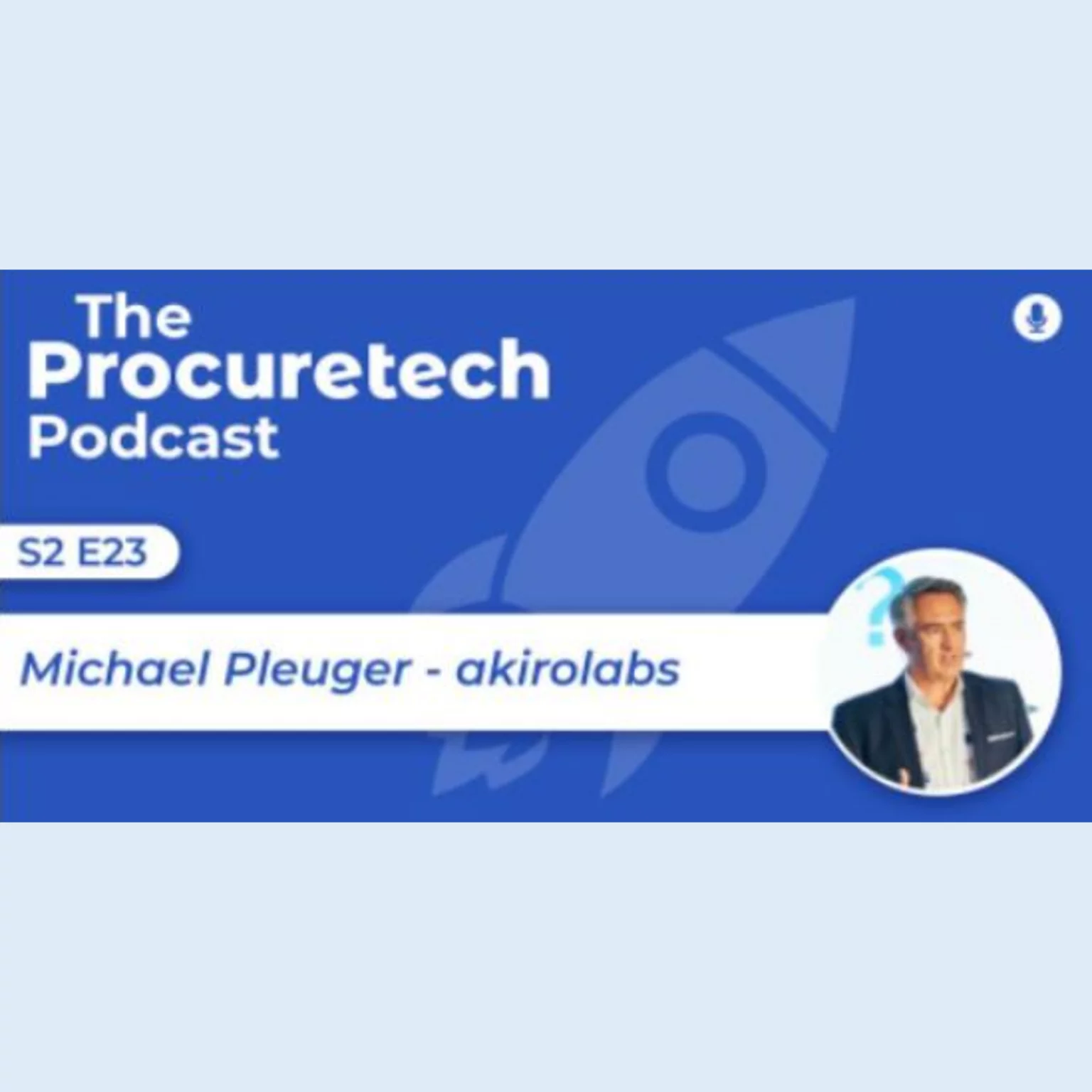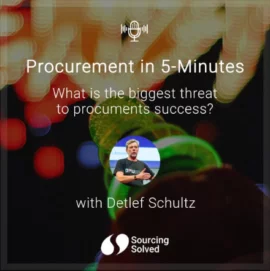Tune into the podcast here. Summary by James Meads on the episode below.
There are many great stories about how startups are created, but this one is particularly interesting. Take a procurement organisation that is often cited as best-in-class, and then challenge it with becoming even better.
Michael Pleuger, is a former Senior Executive at Vodafone Procurement who had the mandate to do just that. The result became akirolabs, and the journey of how this happened is our discussion today.
Making a Best-In-Class Procurement Team even Better: The story of akirolabs and the strive for excellence
Michael’s journey with Vodafone started out with him being part of the team who designed and launched the Vodafone Procurement Company, headquarted in Luxembourg.
akirolabs will enable collaborative strategic procurement and was borne out of him being challenged by Vodafone Procurement Company’s Founder and CEO (now akirolabs Co-Founder) Detlef Schultz, to take their already mature procurement digitisation to the next level.
Beyond category management: filling a white space in today’s procurement technology landscape
To set the scene, Vodafone already had industry-leading digitisation and was performing as one of the best-in-class organisations when it comes to three KPIs of measuring the effectiveness of procurement:
- Value contribution
- Compliance
- Efficiency
Michael couldn’t see at first anything missing from the existing set-up. How do you take that and improve on it.
All operational and tactical procurement was already digitised and automated to a high degree, so the question that Michael got to work on was: how can we make the more strategic side of procurement more digital?
Thinking outside the box and looking at other industries
Michael’s proposal was working around replacing experience with vision, leadership and collaboration.
One of the first things the team did was to bring in McLaren Applied Technologies: the data and analytics spin-off of the McLaren F1 racing team. Just doing that in itself shows that bringing best practices from other industries or walks of life can have a huge impact. When you consider just how many data points a motor racing team has to measure to get one step ahead of their rivals, it’s not surprising that the insights they could offer were hugely insightful.
Classic thinking outside the box. Not “what is our competitor doing?”
How did they arrive at Category Management as the focus area?
Procurement is in a unique position as the node between the business and the supply chain. No other function in the business works with such a diverse range of stakeholders within the business and at the same time looks outwards with the relationships that we manage with external suppliers.
So, what is needed to optimise and leverage this position?
- Connectivity: being the spider at the centre of the web has limited usefulness if the communication channels between all of the interconnected parties are not smooth and accessible to all.
- Prevent Silos and Fragmentation: the necessity to have some kind of “digital glue”, as Michael describes it, to prevent this fragmentation between all of the different stakeholders we come into contact with, both internal and external.
- AI to leverage both the Demand and Supply factors: Procurement essentially works with internal business partners to understand the demands of the business, and then communicates this to external suppliers to understand and secure the supply-related aspects of the puzzle.
With these three factors, the team then concluded that the Category Management process would be the best way to bring all of this together in some digital form.
But does this translate to the average procurement team?
It’s one thing doing this for EUR 26 billion of spend in an extremely mature procurement organisation, but can it translate to the average mid-market business whose digital journey is way less mature?
Michael argues that even if a function is not mature now, having a category management tool such as akirolabs can help organisations to boost their maturity through the world class capabilities that are embedded into the platform.
That’s great, but even when taking budget and organisational maturity aside, what about the people factor? Can this approach still work in a procurement team that isn’t stacked with the best talent?
It’s more a case of attitude rather than pure capability. The platform delivers a large part of the potential capability gap. The key is to be open-minded towards change, regardless of experience levels within any team.
Michael describes a quadrant of the need for collaboration vs. the degree of complexity of the task. The sweet spot for leveraging what they have developed with akirolabs is o have world class methodology embedded into an intuitive workflow, which is then enriched through business foresight with the help of artificial intelligence.
But will Category Management be dead in future?
The business doesn’t think in categories. So, what is the relevance for this management model of procurement as we move forward?
Whereas on the one hand, driving savings will always be a priority for procurement, different businesses require different outcomes from procurement. Not all of these are modelled around managing a category of spend.
For example, gaining efficiencies and driving innovation, to name just two. Take the example of a rapidly scaling startup that needs a procurement function to help their growth while at the same time managing risk and ensuring compliance.
Or one of the Covid vaccine manufacturers who need to work cross-category to ensure there are the raw materials and third-party manufacturing supply chains in place, while at the same time ensuring distribution and logistics to get the product out to those who are expecting it in a timely manner.
A rigid, siloed procurement organisation who only works in category teams is poorly aligned to the business in these cases.
What industry sector or level of procurement maturity does this concept suit?
It theoretically fits into every industry with the “beyond category” concept. However, some industries, such as retail, could find it difficult to adopt.
SMEs can indeed also use it, but there does need to be a certain degree of complexity in any organisation to really be able to leverage all that it can offer. A single-site manufacturing facility would probably not get much benefit from such a tool.
The “single source of truth” concept of having all of your data in one place and being able to maintain continuity when there are people changes in an organisation does, at the end of the day, deliver value to






